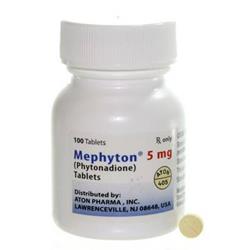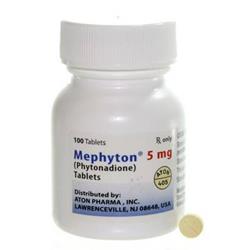Providing Quality & Trust || Clinic Website
Detailed Description
Mephton® (Phytonadione) Tablets
Phytonadione is a vitamin which is a clear, yellow to amber, viscous, and nearly odorless liquid. It is insoluble in water, soluble in chloroform and slightly soluble in ethanol. It has a molecular weight of 450.70. Phytonadione is 2-methyl-3-phytyl-1, 4-naphthoquinone. Its empirical formula is C31H46O2.
MEPHYTON (Phytonadione) tablets containing 5 mg of phytonadione are yellow, compressed tablets, scored on one side. Inactive ingredients are acacia, calcium phosphate, colloidal silicon dioxide, lactose, magnesium stearate, starch, and talc.
Indications and Usage:
MEPHYTON is indicated in the following coagulation disorders which are due to faulty formation of factors II, VII, IX and X when caused by vitamin K deficiency or interference with vitamin K activity. MEPHYTON tablets are indicated in:
- anticoagulant-induced prothrombin deficiency caused by coumarin or indanedione derivatives;
- hypoprothrombinemia secondary to antibacterial therapy;
- hypoprothrombinemia secondary to administration of salicylates;
- hypoprothrombinemia secondary to obstructive jaundice or biliary fistulas but only if bile salts are administered concurrently, since otherwise the oral vitamin K will not be absorbed.
Precautions:
General - Vitamin K1 is fairly rapidly degraded by light; therefore, always protect MEPHYTON from light. Store MEPHYTON in closed original carton until contents have been used. (See also HOW SUPPLIED, Storage.)
Drug Interactions - Temporary resistance to prothrombin-depressing anticoagulants may result, especially when larger doses of phytonadione are used. If relatively large doses have been employed, it may be necessary when reinstituting anticoagulant therapy to use somewhat larger doses of the prothrombin-depressing anticoagulant, or to use one which acts on a different principle, such as heparin sodium.
Laboratory Tests - Prothrombin time should be checked regularly as clinical conditions indicate.
Carcinogenesis, Mutagenesis, Impairment of Fertility - Studies of carcinogenicity or impairment of fertility have not been performed with MEPHYTON. MEPHYTON at concentrations up to 2000 mcg/plate with or without metabolic activation, was negative in the Ames microbial mutagen test.
Pregnancy - Pregnancy Category C: Animal reproduction studies have not been conducted with MEPHYTON. It is also not known whether MEPHYTON can cause fetal harm when administered to a pregnant woman or can affect reproduction capacity. MEPHYTON should be given to a pregnant woman only if clearly needed.
Pediatric Use - Safety and effectiveness in pediatric patients have not been established with MEPHYTON. Hemolysis, jaundice, and hyperbilirubinemia in newborns, particularly in premature infants, have been reported with vitamin K.
Nursing Mothers - It is not known whether this drug is excreted in human milk. Because many drugs are excreted in human milk, caution should be exercised when MEPHYTON is administered to a nursing woman.
Geriatric Use - Clinical studies of MEPHYTON did not include sufficient numbers of subjects aged 65 and over to determine whether they respond differently from younger subjects. Other reported clinical experience has not identified differences in responses between the elderly and younger patients. In general, dose selection for an elderly patient should be cautious, usually starting at the low end of the dosing range, reflecting the greater frequency of decreased hepatic, renal, or cardiac function, and of concomitant disease or other drug therapy.
Adverse Reactions:
Severe hypersensitivity reactions, including anaphylactoid reactions and deaths have been reported following parenteral administration. The majority of these reported events occurred following intravenous administration.
Transient “flushing sensations” and “peculiar” sensations of taste have been observed with parenteral phytonadione, as well as rare instances of dizziness, rapid and weak pulse, profuse sweating, brief hypotension, dyspnea, and cyanosis.
Hyperbilirubinemia has been observed in the newborn following administration of parenteral phytonadione. This has occurred rarely and primarily with doses above those recommended.
Dosage and Administration:
Anticoagulant-Induced Prothrombin Deficiency in Adults - To correct excessively prolonged prothrombin times caused by oral anticoagulant therapy – 2.5 to 10 mg or up to 25 mg initially is recommended. In rare instances 50 mg may be required. Frequency and amount of subsequent doses should be determined by prothrombin time response or clinical condition. (See WARNINGS.) If, in 12 to 48 hours after oral administration, the prothrombin time has not been shortened satisfactorily, the dose should be repeated.
Hypoprothrombinemia Due to Other Causes in Adults - If possible, discontinuation or reduction of the dosage of drugs interfering with coagulation mechanisms (such as salicylates, antibiotics) is suggested as an alternative to administering concurrent MEPHYTON. The severity of the coagulation disorder should determine whether the immediate administration of MEPHYTON is required in addition to discontinuation or reduction of interfering drugs.
A dosage of 2.5 to 25 mg or more (rarely up to 50 mg) is recommended, the amount and route of administration depending upon the severity of the condition and response obtained.
The oral route should be avoided when the clinical disorder would prevent proper absorption. Bile salts must be given with the tablets when the endogenous supply of bile to the gastrointestinal tract is deficient.
Supplied:
No. 7776 - Tablets MEPHYTON, 5 mg vitamin K1, are yellow, round, scored, compressed tablets, coded MSD 43 on one side and MEPHYTON on the other. They are supplied as follows: NDC 0006-0043-68 bottles of 100.
Storage:
Store in tightly closed original container at 25°C (77°F); excursions permitted to 15-30°C (59 86°F) [see USP Controlled Room Temperature]. Always protect MEPHYTON from light. Store in tightly closed original container and carton until contents have been used. (See PRECAUTIONS, General.)
Powered by nopCommerce
This site is running in live payment mode. Real payments will be processed.

